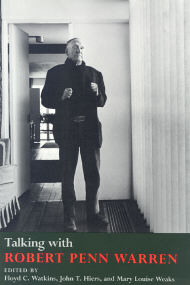|
|
|
| RPW On Being a Southern Writer: "It never crossed my mind when I began writing fiction that I could write about anything except life in the South. It never crossed my mind that I knew about anything else; know, that is, at the level you know something to write about it. Nothing else ever nagged you enough to stir the imagination." |
RPW On Black Americans: "The Negro in a secret and suppressed has made great contributions to American life, even when he was supposedly cut off from participation. The effect of the Negro has been enormous. We can't even guess what America would have been like without the Negro. No Civil War, a totally different structure of American life, different language, different music. Yet while the Negro has made an enormous impact racially, he's been cut off individually. This full recognition, the full release of energy, could come anytime in the next fifteen to thirty years. And it will be tremendous." |
| Filled with entertaining anecdotes and personal reflections,
this collection of twenty-four conversations with Robert Penn Warren provides an
illuminating glimpse of the man and his thoughts on life and literature. Ranging from a
self-interview to transcripts of television appearances to discussions with other writers
such as Flannery O'Connor, Ralph Ellison, and William Styron, these dialogues encompass
Warren's wide interests-history, politics, technological change, teaching, race
relations-and span a period of more than three decades. "Perhaps in no literary genre is an author more completely and accurately himself or herself than in an interview," the editors note. "Every attribute of Robert Penn Warren-his folksiness, his wit, his honesty and openness-or, in short, the full man-is peculiarly adapted to the genre." Strongly apparent, for example, are Warren's feelings about his country: "I'm in love with America; the funny part of it is, I really am," he tells Bill Moyers. Even so, he does not shrink form criticizing America's shortcomings as his comments to Edwin Newman about the Civil War and the country's involvement in Vietnam make clear. Warren's asides are replete with biographical gems. To interviewer Peter Stitt he remarks that he never intended to go to Vanderbilt, but to Annapolis, and that once at Vanderbilt, his original chosen vocation was chemical engineering-a goal that changed after he enrolled in a literature class taught by John Crowe Ransom. Particularly revealing, however-especially to young writers-are Warren's reflections on the creative process. "Don't leave a page until you have it as near what you want as you can make it that day," he advises. When Warren speaks of his own writing career, there is no false modesty in his statements about his "trying" to be a writer or of "inching" along in the creative process. Rather, one sees a man who knows well the very tentative and makeshift nature of literary effort. While offering views on other writers-from Homer and Shakespeare to Hemingway and Nikki Giovanni-Warren reflects as well on the role of criticism: "All the study about a writer or a work, all the analyses of background or ideas or the structure of a work-the purpose of all this is to prepare the reader to confront the work with innocence, with simplicity, and with directness." And when asked if "poetic value" can be defined, Warren answers, "Well, if I could define it today, I wouldn't accept the same definition tomorrow." Robert Penn Warren, the country's first poet laureate and the only writer to win the Pulitzer Prize in both fiction and poetry, left no autobiography. Thus, Warren's conversations become one of the most important single sources for anyone seeking to understand his life and art. |
|
